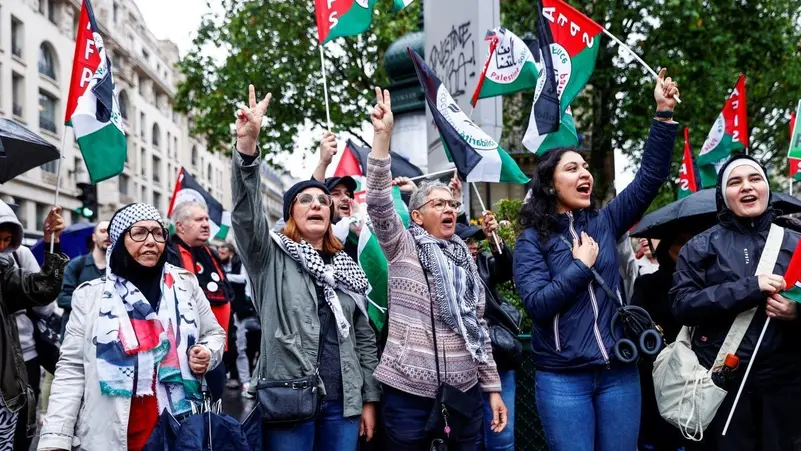
Hundreds of protesters assembled peacefully in Paris on Friday, rallying against an interview with Israeli Prime Minister Benjamin Netanyahu broadcast by France’s private television station, TF1. The demonstration took place outside the network's offices in the western suburbs of Paris.
The demonstrators, prevented from approaching the building by a significant police presence, brandished Palestinian flags and voiced their solidarity with Gaza. Chants of "Gaza, Paris is with you," "Immediate ceasefire!" and "Israel, murderer" echoed through the crowd, underscoring the protesters' condemnation of the ongoing conflict and the interview itself.
In the controversial interview aired on TF1’s news channel LCI, Netanyahu staunchly defended his military actions in Gaza. He claimed that the ratio of civilian casualties to those of Palestinian combatants was the lowest seen in any urban conflict. Netanyahu further asserted that Israel was not deliberately targeting civilians or attempting to cause a famine in Gaza, dismissing such accusations as "anti-Semitic slander."
However, these statements starkly contrast with reports from United Nations agencies, humanitarian organizations, and foreign governments, which highlight the dire humanitarian crisis unfolding in Gaza. According to these sources, Gaza is on the brink of famine due to Israel's stringent restrictions on the entry of humanitarian aid. Since October 7, the conflict has resulted in at least 36,224 Palestinian deaths and 81,777 injuries, painting a grim picture of the human toll of the ongoing violence.

The humanitarian catastrophe has been exacerbated by the displacement of over a million people as a result of Israel's ground invasion of Rafah. This offensive continues despite widespread international condemnation and a directive from the International Court of Justice in The Hague, calling for an immediate withdrawal from the city. The court's orders have so far been ignored, further inflaming tensions and raising questions about adherence to international law.
The Paris protest reflects broader global discontent with the situation in Gaza and the international community's response. Demonstrators in Paris expressed their frustration not only with Netanyahu's policies but also with the platform given to him by TF1. Many feel that airing the interview without sufficient scrutiny of Netanyahu's claims amounts to a tacit endorsement of his actions, thus contributing to the perpetuation of the conflict.
Human rights organizations and advocacy groups have been vocal about the need for increased pressure on Israel to ease the humanitarian blockade on Gaza and to seek a peaceful resolution to the conflict. The Paris protest is one of many similar demonstrations occurring worldwide, signaling a growing movement demanding justice and humanitarian relief for the people of Gaza.
As the situation in Gaza continues to deteriorate, the role of media in shaping public perception and policy cannot be overstated. The TF1 interview with Netanyahu has sparked significant controversy, highlighting the complex interplay between media, politics, and public opinion in the context of the Israeli-Palestinian conflict. The Paris protesters' call for immediate action and accountability underscores the urgent need for a concerted international effort to address the humanitarian crisis in Gaza and to pave the way for a lasting peace.











